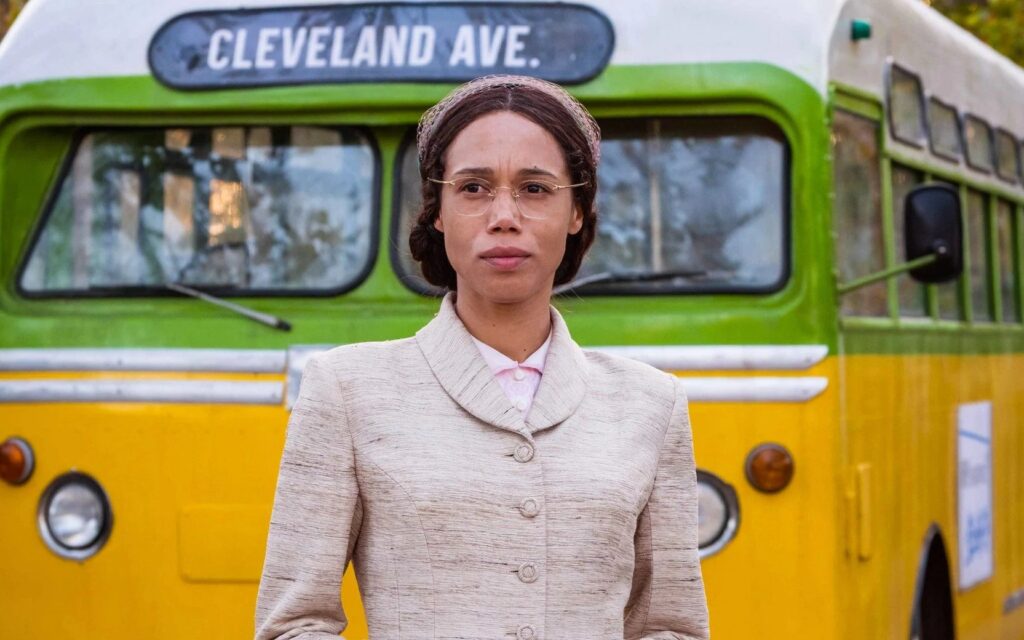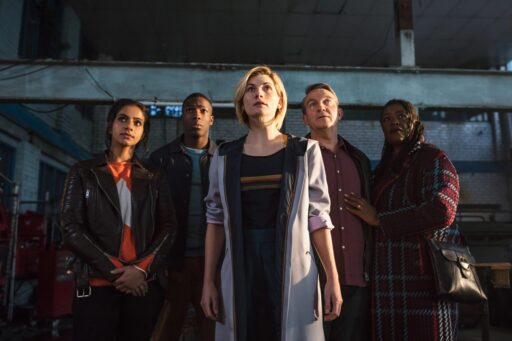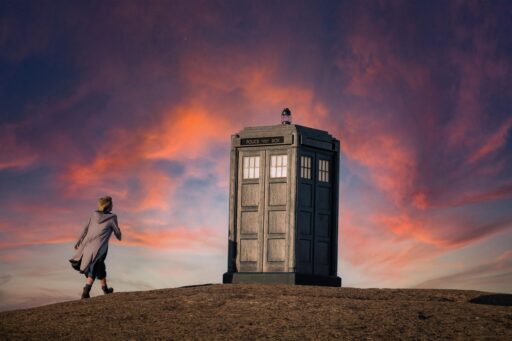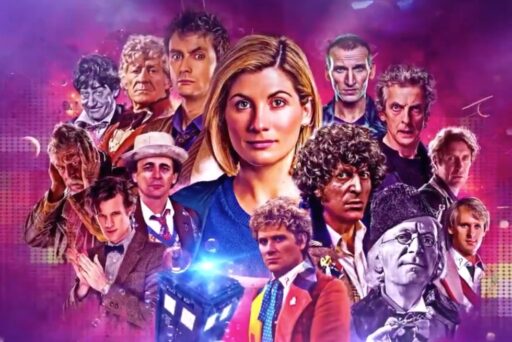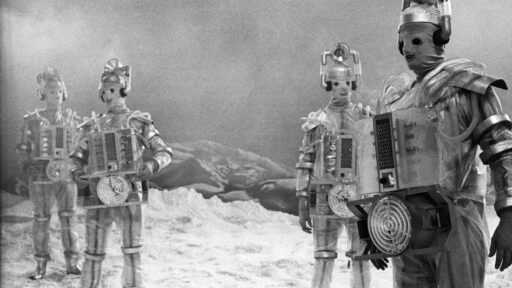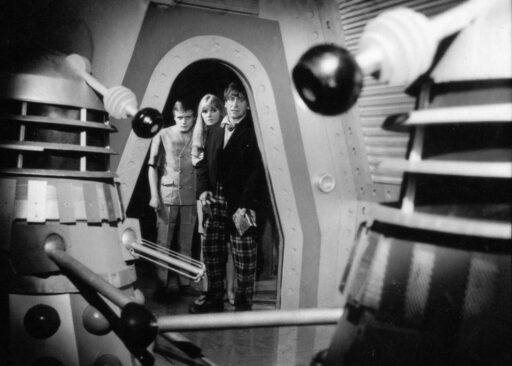I was looking forward to rewatching this one because the historical episodes are generally the ones held in highest regard in the Chris Chibnall era. Tackling a subject like Rosa Parks, a central figure in the history of US Civil Rights, is dangerous ground for a British show that generally isn’t that serious.
So let’s get the elephant in the room out the way first, this is not historically accurate. Which is a statement I could probably make about every single historical Doctor Who episode, but with this being a comparatively recent event (within some people’s lifetimes) it’s worth emphasizing. If you’re looking for facts I would encourage you to watch a documentary or read a book, not watch an episode of Doctor Who. Any value that this episode brings in terms of the subjects of Civil Rights or Rosa Parks herself are simply in drawing further attention to her outside of the US itself.
This Isn’t Where We Are Supposed to Be
Oh look, the Doctor can’t control where the TARDIS lands, I’ve missed that. There is an implication here that the TARDIS might have deliberately redirected them, or maybe it just got confused because of that Artron energy, but the point is this isn’t something the Doctor chose, she’s a cosmic hobo once more. I like it. It seems to me that even only three episodes in to his run it’s clear Chibnall is eager to reintroduce some elements from Classic Who which have been heavily downplayed in the modern series. Those would include the larger group of companions (only true in some eras of the show) and the Doctor just bouncing around the universe stumbling into things.
You Folks Ain’t From Round Here
The way Ryan gets slapped early on in this episode is a striking and effective image. It feels real to me in a way that sci-fi violence doesn’t and also shocking because it’s happening in Doctor Who. I also think that the anger that we see from these people is well observed, when people feel threatened (physically, emotionally or intellectually) lashing out in anger is often the reaction. In large part these “policies” in the South were about control and any threat to that control had to be smothered. We see this play out a few times for example when the bus driver is challenged, when Ryan tries to help a white woman and even the quiet anger when all of them are sitting together in a bar that only serves whites.

There is a tendency to simplify racism and racists by thinking of them as either tattooed, violent thugs or white hood wearing idiots. Seeing racism as something that only comic book villains do makes it easier to accept. What that misses is these sorts of situations can only be sustained by at least a tacit agreement of the majority of the population. A majority that probably considered themselves to be good, Christian people and who actually probably did give to charity and do other good things. People are complicated mmmkay?? Here for the most part we get very ordinary people who react with anger and violence when their normal is threatened and that is a much more chilling form of racism in many ways. Rosa doesn’t make any effort to show the white citizens of Montgomery in a good light, there’s no time wasted on showing us white people agonizing over their decisions, they just conform with society and in the process oppress.
Some might be inclined to think these scenes are stereotypical in their portrayal and in a sense they probably are. However, speaking as someone who spent half his life in Scotland and has spent the second living in West Virginia, let me tell you, those stereotypes come from a real place.
The Doctor Can’t Fix Racism
One thing I am very glad of is that they introduced an alien factor in this episode. I understand that some people are really keen to see a pure historical and that might be interesting in some situations, but for me at least this is not one of them. The Doctor needed an opponent to work against and that opponent absolutely could not be Segregation. For her to have played a direct and pivotal role in changing that would be incredibly dismissive of the sacrifices that real people made. So the Doctor doesn’t make a speech to change people’s minds, nor does she save Rosa Parks in any fashion.

I’m much happier seeing the Doctor and fam repeatedly outwitting Krasco to keep things on track and then very awkwardly sitting there and participating on the bus. She is still very much an active participant and not a bystander in the story, outwitting Krasco twice and driving the plan to keep time on track but she’s not a white savior here.
I must say one of the things I really enjoyed this episode was watching the back and forth of The Doctor and Krasco trying to upset and reset time, it was a fun sequence. There’s been a fair amount of criticism of Krasco because, theory goes, this type of racism should be long gone by his time. This is the least important detail in the entire episode and I’m not sure why people are so hung up on it. Racism is irrational, people can get fixated on things and use them as an excuse, the why behind Krasco just isn’t that interesting.
After School Special?
Once again the dialogue is very on the nose in this episode, in some ways even more so than in the previous two. The episode was written by Chris Chibnall and Malorie Blackman whereas the first two were just by Chibnall, which raises an interesting question. Does Blackman always write in this fashion, was she influenced by Chibnall or is the approach actually some sort of writing style directive for the season?
It’s made even worse in this episode by the need to cram in so much information about Rosa Parks. We have a couple of scenes that have an after school special tone to them as characters hurriedly recite key information for us to absorb. Clearly there is a strong intention on the show’s part to be more than purely entertaining but serving two bosses like this is not easy. In order to avoid these info dumps they would need to have given us more time showing Rosa’s life, but if they did that they’d effectively have cut the Doctor and companions out of the episode.
Checking in on Yaz
We get quite a lot of character moments this episode, not all of them are dialogue either. For example the look on Yaz’ face as she steps out of the TARDIS shows that she is clearly the most excited of all the companions to be traveling through time like this. It’s not that the others hate it, but while they’re a little hesitant, she is beaming. We arguably still have less development of Yaz over three episodes than we have on the other two, but I’d say her personality is pretty firmly shaped at this point and to me at least it’s very clear why she continues to travel with the Doctor.

I’m guessing a lot of people won’t have liked the conversation between Yaz and Ryan. It’s certainly another case of telling rather than showing, but again, in the confines of this episode you can’t show these things and yet they are directly relating it to what is happening in this episode. To my mind then, this is an example of when telling is what you need to do.
Ryan and Graham also get their moments to shine. Ryan, still putting up that cocky front, but genuinely shocked by the level of blatant anger he encounters even though it’s clearly not the first time he’s had to deal with racism. Graham gets less to work with but his conversation with the Doctor is touching. Overall I think this episode handles all the characters well and shows that it’s entirely possible to work with a “crowded TARDIS”.
A Mixed Success Then?
It feels a bit lecturing at times and I think the worthy goal of educating children does get a bit overbearing at times, but that’s only a few minutes out of the running time, most of which is a fun Doctor Who adventure so for the most part I do like this story. I don’t think a longer running time would have solved the problems it does have as it strikes me they are mostly just a clash of objectives.
I also want to mention the soundtrack as I haven’t really touched on sound so far in these reviews. There’s a simple reason for that which is that most of the time I don’t notice soundtracks unless they are getting overbearing. I don’t think that is a bad thing as sound is supposed to enhance the mood, not be the star. In this episode though I did find the way sound was used very effective at building tension which is exactly what was needed.
Scores: Words, not numbers man. Words not numbers!
Discover more from Veristopia
Subscribe to get the latest posts sent to your email.


